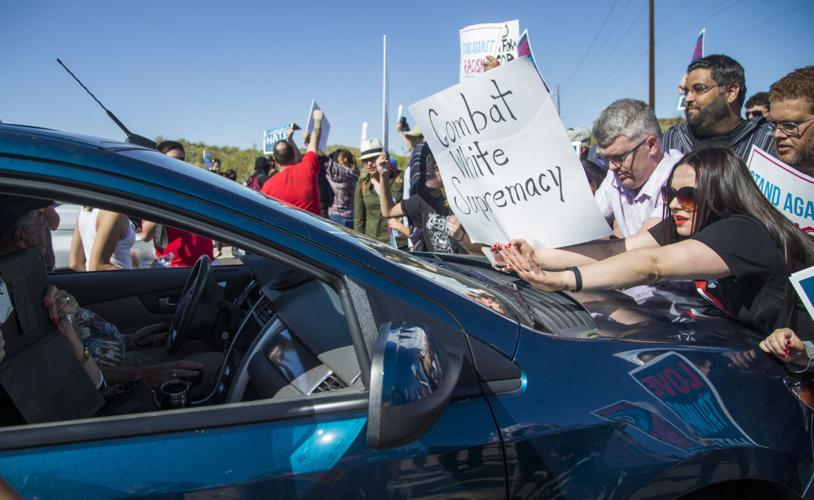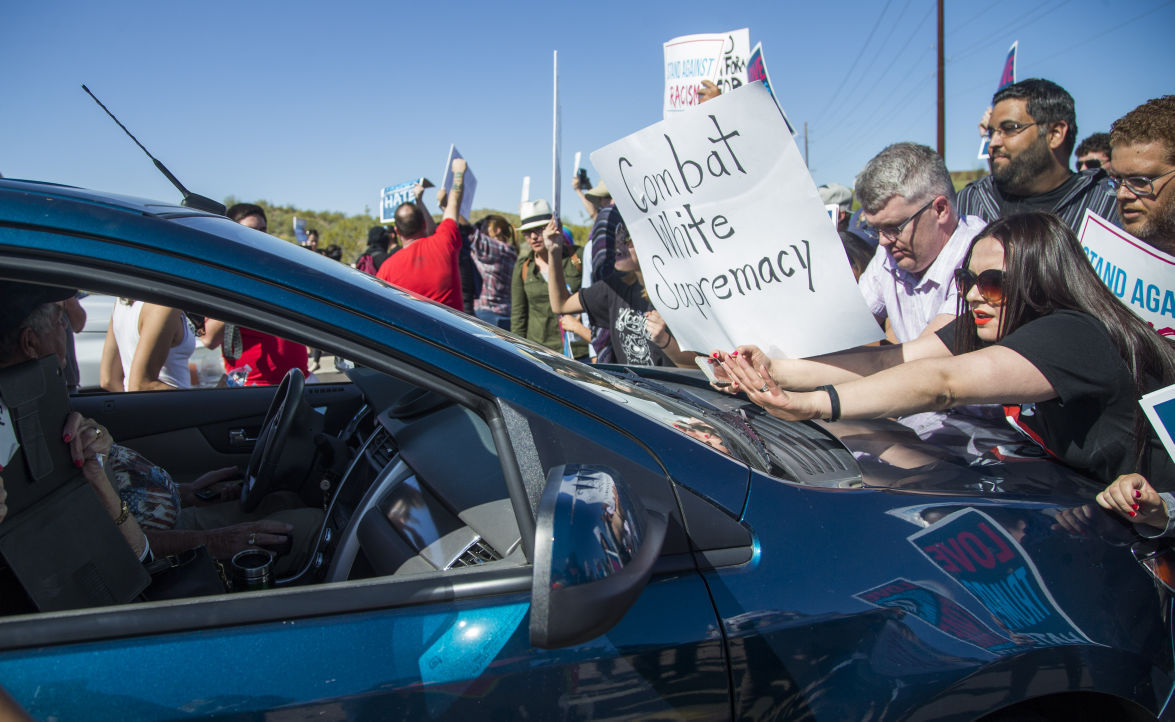PHOENIX — Gov. Doug Ducey signed legislation Monday that could result in longer jail time for some protesters even as it gives additional rights to others.
Ducey penned his approval to HB 2548, which was originally crafted to forbid state universities and community colleges from unlawfully restricting a student’s right to speak. Rep. Paul Boyer, R-Phoenix, said he wanted to be sure that “noncommercial expressive activity” was protected on campuses, backed by the threat of a lawsuit.
But the final version of the measure signed by the governor allows judges to impose six-month jail terms on protesters who stop traffic headed to political rallies. The same penalty would apply to those who, after ignoring a warning, block anyone from heading to government meetings or hearings.
Ducey also signed HB 2615, which spells out that, with limited exceptions, community colleges and state-run universities cannot limit where the right of free speech can be exercised. The legislation applies to common areas of campuses and not inside the buildings themselves.
Rep. Anthony Kern, R-Glendale, said the measure is a direct outgrowth of his experience when he was younger trying to hand out material about his church at Glendale Community College. He said college officials shunted students off to a designated “free speech zone,” a place that was nowhere near the people his group was trying to reach.
The new laws could most immediately affect a federal court lawsuit filed last year by two students at Paradise Valley Community College who said the school was illegally requiring groups to get permits and provide prior notice before any activities on campus. They also are objecting to a college policy that restricts those who want to demonstrate or hand out literature to certain areas of campus.
College officials have denied they are violating anyone’s rights.
But the most controversial provisions appear to be those aimed at protesters off campus.
It was crafted by Sen. John Kavanagh, R-Fountain Hills, after protesters blocked Shea Boulevard in March to prevent Republican presidential hopeful Donald Trump from getting to a rally in that community and to keep people from hearing him speak.
While it tied up traffic and several people were arrested, the event went on.
Kavanagh pointed out that existing law provides for a penalty of 30 days in jail and a $500 fine for blocking traffic.
He said that’s fine for someone who is “being rowdy on Mill Avenue” in Tempe. But, Kavanagh argued — and his colleagues agreed — something more is appropriate for those who intentionally block access to government meetings, hearings and campaign events.
The new law, which takes effect Aug. 6, subjects those individuals to up to six months in jail and a $2,500 fine.
“These bills protect free speech throughout our college campuses and also ensure an individual’s right to engage in free speech isn’t shut down by someone else who disagrees with his or her perspective,” Ducey said in a prepared statement.
And gubernatorial press aide Daniel Scarpinato said just having the enhanced penalty on the books should help.
“That hopefully will create a deterrent for people intruding on others’ abilities,” he said.
“There’s a balance here of everyone getting their voice heard,” Scarpinato said. “And if someone is physically preventing someone from participating in exercising their constitutional rights, that is unacceptable.”
Whether the measure is legal, however, remains to be seen.
Sen. Steve Farley, D-Tucson, said lawmakers cannot decide that a person’s motive for blocking traffic makes him or her subject to a harsher penalty.
In fact, Farley said an argument could be made that the people blocking traffic were exercising their own First Amendment rights.
“One man’s blocking a political event is another man’s expression of political beliefs,” he said during Senate debate. Farley predicted the enhanced penalty will be struck down by the courts.
Kavanagh, however, had a different take on it.
“To stop somebody from going to a political rally to hear a candidate is not furthering the First Amendment,” he said. “It is suppressing that person’s First Amendment right to assembly.”
Scarpinato said Ducey agrees.
“The current law already addresses some of this,” he said. “This makes it more focused on these particular areas.”
Kavanagh also rejected claims by other lawmakers that the only reason behind the legislation was to gain some publicity for Trump. He said the same protections would now apply to those who block access to anyone’s political event.
“This can happen to any candidate because no side of the political spectrum is immune from having radical people who disrespect other people’s rights,” he argued during the Senate debate. “Both sides should be punished when they do that.”
The governor also said that part of the university experience is to be able to express diverse views, “openly, without fear of retribution or intimidation, and to be exposed to other views and perspectives, even if they aren’t politically correct or popular.”
The section of HB 2548 that deals with campus free speech has some teeth.
It allows the attorney general or any student whose “expressive rights were violated” to bring a lawsuit in court. If a judge finds there was a violation, he or she must issue an injunction against the school and is required to have the offending institution pay “reasonable court costs and reasonable attorney fees.”







